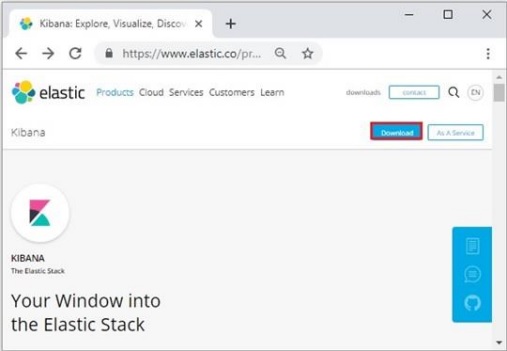
- Elasticsearch - Home
- Elasticsearch - Basic Concepts
- Elasticsearch - Installation
- Elasticsearch - Populate
- Migration between Versions
- Elasticsearch - API Conventions
- Elasticsearch - Document APIs
- Elasticsearch - Search APIs
- Elasticsearch - Aggregations
- Elasticsearch - Index APIs
- Elasticsearch - CAT APIs
- Elasticsearch - Cluster APIs
- Elasticsearch - Query DSL
- Elasticsearch - Mapping
- Elasticsearch - Analysis
- Elasticsearch - Modules
- Elasticsearch - Index Modules
- Elasticsearch - Ingest Node
- Elasticsearch - Managing Index Lifecycle
- Elasticsearch - SQL Access
- Elasticsearch - Monitoring
- Elasticsearch - Rollup Data
- Elasticsearch - Frozen Indices
- Elasticsearch - Testing
- Elasticsearch - Kibana Dashboard
- Elasticsearch - Filtering by Field
- Elasticsearch - Data Tables
- Elasticsearch - Region Maps
- Elasticsearch - Pie Charts
- Elasticsearch - Area and Bar Charts
- Elasticsearch - Time Series
- Elasticsearch - Tag Clouds
- Elasticsearch - Heat Maps
- Elasticsearch - Canvas
- Elasticsearch - Logs UI
- Elasticsearch Useful Resources
- Elasticsearch - Quick Guide
- Elasticsearch - Useful Resources
- Elasticsearch - Discussion
Elasticsearch - Installation
In this chapter, we will understand the installation procedure of Elasticsearch in detail.
To install Elasticsearch on your local computer, you will have to follow the steps given below −
Step 1 − Check the version of java installed on your computer. It should be java 7 or higher. You can check by doing the following −
In Windows Operating System (OS) (using command prompt)−
> java -version
In UNIX OS (Using Terminal) −
$ echo $JAVA_HOME
Step 2 − Depending on your operating system, download Elasticsearch from www.elastic.co as mentioned below −
For windows OS, download ZIP file.
For UNIX OS, download TAR file.
For Debian OS, download DEB file.
For Red Hat and other Linux distributions, download RPN file.
APT and Yum utilities can also be used to install Elasticsearch in many Linux distributions.
Step 3 − Installation process for Elasticsearch is simple and is described below for different OS −
Windows OS− Unzip the zip package and the Elasticsearch is installed.
UNIX OS− Extract tar file in any location and the Elasticsearch is installed.
$wget https://artifacts.elastic.co/downloads/elasticsearch/elasticsearch7.0.0-linux-x86_64.tar.gz $tar -xzf elasticsearch-7.0.0-linux-x86_64.tar.gz
Using APT utility for Linux OS− Download and install the Public Signing Key
$ wget -qo - https://artifacts.elastic.co/GPG-KEY-elasticsearch | sudo apt-key add -
Save the repository definition as shown below −
$ echo "deb https://artifacts.elastic.co/packages/7.x/apt stable main" | sudo tee -a /etc/apt/sources.list.d/elastic-7.x.list
Run update using the following command −
$ sudo apt-get update
Now you can install by using the following command −
$ sudo apt-get install elasticsearch
Download and install the Debian package manually using the command given here −
$wget https://artifacts.elastic.co/downloads/elasticsearch/elasticsearch7.0.0-amd64.deb $sudo dpkg -i elasticsearch-7.0.0-amd64.deb0
Using YUM utility for Debian Linux OS
Download and install the Public Signing Key −
$ rpm --import https://artifacts.elastic.co/GPG-KEY-elasticsearch
ADD the following text in the file with .repo suffix in your /etc/yum.repos.d/ directory. For example, elasticsearch.repo
elasticsearch-7.x] name=Elasticsearch repository for 7.x packages baseurl=https://artifacts.elastic.co/packages/7.x/yum gpgcheck=1 gpgkey=https://artifacts.elastic.co/GPG-KEY-elasticsearch enabled=1 autorefresh=1 type=rpm-md
You can now install Elasticsearch by using the following command
sudo yum install elasticsearch
Step 4 − Go to the Elasticsearch home directory and inside the bin folder. Run the elasticsearch.bat file in case of Windows or you can do the same using command prompt and through terminal in case of UNIX rum Elasticsearch file.
In Windows
> cd elasticsearch-2.1.0/bin > elasticsearch
In Linux
$ cd elasticsearch-2.1.0/bin $ ./elasticsearch
Note − In case of windows, you might get an error stating JAVA_HOME is not set, please set it in environment variables to C:\Program Files\Java\jre1.8.0_31 or the location where you installed java.
Step 5 − The default port for Elasticsearch web interface is 9200 or you can change it by changing http.port inside the elasticsearch.yml file present in bin directory. You can check if the server is up and running by browsing http://localhost:9200. It will return a JSON object, which contains the information about the installed Elasticsearch in the following manner −
{
"name" : "Brain-Child",
"cluster_name" : "elasticsearch", "version" : {
"number" : "2.1.0",
"build_hash" : "72cd1f1a3eee09505e036106146dc1949dc5dc87",
"build_timestamp" : "2015-11-18T22:40:03Z",
"build_snapshot" : false,
"lucene_version" : "5.3.1"
},
"tagline" : "You Know, for Search"
}
Step 6 − In this step, let us install Kibana. Follow the respective code given below for installing on Linux and Windows −
For Installation on Linux −
wget https://artifacts.elastic.co/downloads/kibana/kibana-7.0.0-linuxx86_64.tar.gz tar -xzf kibana-7.0.0-linux-x86_64.tar.gz cd kibana-7.0.0-linux-x86_64/ ./bin/kibana
For Installation on Windows −
Download Kibana for Windows from https://www.elastic.co/downloads/kibana Once you click the link, you will find the home page as shown below −

Unzip and go to the Kibana home directory and then run it.
CD c:\kibana-7.0.0-windows-x86_64 .\bin\kibana.bat